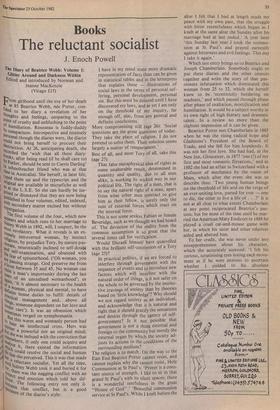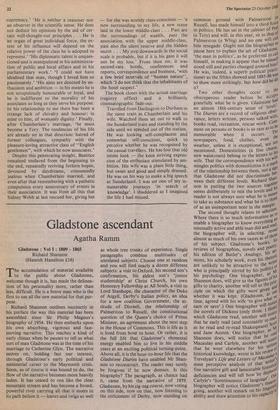Books
The reluctant socialist
J. Enoch Powell
The Diary of Beatrice Webb: Volume 1: Glitter Around and Darkness Within Edited and introduced by Norman and Jeanne MacKenzie (Virago £15)
From girlhood until the eve of her death at 85 Beatrice Webb, née Potter, con- fided to her diary a revelation of her thoughts and feelings, unsparing to the Point of cruelty and unblushing to the point of humiliation. Rousseau is fuddy-duddy uY comparison. Introspective and intensely Personal though the diaries were, the diarist could not bring herself to procure their destruction. At 26, anticipating death, she recorded the 'wish that all these diary- b°oks, after being read (if he shall care to) ,"Y Father should be sent to Carrie Darling' to schoolteacher friend who was at that tithe in Australia). She herself, in later life, `Yr3ed them up and the typescript and the original are available in micrpfiche as well as at the L.S.E. So she can hardly be sur- prised or dismayed that they are now being Published in four volumes, edited, indexed, with secondary matter excised but without ekPurgation, a The first volume of the four, which now stPeaY Webb irs and which runs to her marriage to '"en 1892, will, I suspect, be the tfilrest revelatory. What it reveals is an ex- eel!nelY introverted woman, by instinct religious, by prejudice Tory, by nature pas- aZillare, neurotically inclined to self-doubt ti:,,self-examination, and obsessed with fear of spinsterhood. ('Oh woman, you a'ie Passing strange. God preserve me from 2.ver between 35 and 45. No woman can yea ist a
man's importunity during the last
2 of an unrealised womanhood'; or offiri, It is almost necessary to the health der" woman, physical and mental, to have oraillite home duties to fulfil: details of thin management management and, above all ten-deser, someone dependent on her love and "was an obsession which 1;iletirnes verged on nymphomania. tbit this warm and womanly person had 44,e-cll. an intellectual cross. Hers was bill tier a powerful nor an original mind; to she Was imbued with the conviction that (.0 i anZewhere, if only one could acquire and which it, there existed the information ills couldcould resolve the social and human her that she perceived. This it was that made t,ntil reluctant socialist. Yet all the time, her, IS,idheY Webb took it and buried it for ihsti tIlere was the nagging conflict with an fi..'llet and emotion which told her dif- .te, 14 ,"'. The following entry not only il- 1 hei s that conflict, but is a good rilen of the diarist's style:
I have in my mind some more dramatic representation of facts than can be given in statistical tables and in the letterpress that explains these — illustrations of social laws in the terms of personal suf- fering, personal development, personal sin. But this must be delayed until I have discovered my laws, and as yet I am only on the threshold of my inquiry, far enough off, alas, from any general and definite conclusions.
More compromising still (age 26): 'Social questions are the great questions of today.
They take the place of religion. I do not pretend to solve them. Their solution seems largely a matter of temperament.'
Best of all, and most Tory of all, take this (age 27): That false metaphysical idea of rights as some unalterable result, determined in quantity and quality, due to all men alike, is working its wicked way in our political life. The right of a man, that is
to say the natural right of a man, apart from what other men contract to give him as their fellow, is surely only the sum of external forces which react on the internal force.
This is not some sexless Fabian or female Beveridge, such as we thought we had heard of. The deviation of the reality from the common assumption is so great that the several items call for verification.
Would Disraeli himself have quarrelled with this brilliant self-confession of a Tory (age 25)? In practical politics, if we are forced to interfere through government with the sequence of events and to introduce new factors which will interfere with the natural order of things, is it not safer on the whole to be governed by the instinc- tive cravings of society than by theories based on 'little knowledge'? Why should
we not regard society as an individual,
and acknowledge that it is natural and right that it should gratify the sensations and desires through the agency of self- government? Is it not possible that government is not a thing external and foreign to the community but merely the external organ by which the society ad- justs its actions to the conditions of the surrounding medium?
The religion is to match. On the way to the East End Beatrice Potter cannot resist, and cannot explain why she cannot resist, Holy Communion at St Paul's: 'Prayer is a cons- tant source of strength. I like to sit in that grand St Paul's with its silent spaces; there is a wonderful restfulness in the great "House of God".' Beantiful communion service at St Paul's. While I knelt before the altar I felt that I had at length made my peace with my own past, that the struggle with bitter resentfulness which began as I knelt at the same altar the Sunday after his marriage had at last ended.' A year later 'this Sunday last year I took the commu- nion at St Paul's and prayed earnestly against bitterness and evil feelings. This day I take it again.'
Which last entry brings us to Beatrice and Joseph Chamberlain. Somebody ought to put these diaries and the other sources together and write the story of that pas- sionate infatuation which dominated this woman from 25 to 32, which she herself knew to be 'eccentricity bordering on madness,' and which passed through phase after phase of exaltation, mortification and humiliation. It would be a subject worthy in its own right of high literary and dramatic talent. In a review no more than the slightest impression of it can be given.
Beatrice Potter met Chamberlain in 1883 when he was the rising radical hope and Gladstone's President of the Board of Trade, and she fell for him hopelessly. It was not her first love. She had had, at the New Inn, Gloucester, in 1877 'one (!) of my first and most romantic flirtations,' and in 1882 she had an affair in Switzerland with a professor of mechanics by the name of Main, which after the event she was to describe thus: 'Two young human beings on the threshold of life and on the verge of an ever-uniting love, parted for ever — one to die, the other to live a life of . . .?' It is not at all clear to what extent Chamberlain at any point reciprocated Beatrice's pas- sion; but for most of the time until he mar- ried the American Mary Endicott in 1888 he played a cruel cat-and-mouse game with her, in which his sister and other relatives aided and abetted him.
To her credit, she was never under any misapprehension about his character, which she accurately assessed: 'I felt his curious, scrutinising eyes noting each move- ment as if he were anxious to ascertain whether I yielded to his absolute supremacy.' He is neither a reasoner nor an observer in the scientific sense. He does not deduce his opinions by the aid of cer- tain well-thought-out principles . . . He is an organ of great individual force, the ex- tent of his influence will depend on the relative power of the class he is adopted to represent.' His diplomatic talent is unques- tioned and is manipulated in his administra- tion of public and local affairs and in his parliamentary work.' I could not have idealised that man, though I loved him so passionately.' His aims are, denoted by en- thusiasm and ambition — in his means he is not scrupulously honourable or loyal, and he is indifferent to the morality of his associates so long as they serve his purpose. In his relationship to me there has been a strange lack of chivalry and honour; in mine to him, of womanly dignity.' Finally, after Chamberlain's marriage, 'he must become a Tory. The tendencies of his life are already set in that direction: hatred of former colleagues, sympathy with the pleasure-loving attractive class of "English gentlemen", with which he now associates.'
Despite this penetrating insight, Beatrice remained enslaved from the beginning to the end, repeatedly reviving forlorn hopes, devoured by daydreams, consumedly jealous when Chamberlain married, and even after that remembering with a pathetic compulsion every anniversary of events in their association. It was from all this that Sidney Webb at last rescued her, giving her — for she was acutely class-conscious — 'a new surrounding to my life, a new scene laid in the lower middle-class . . . Past are the surroundings of wealth, past the association with the upper middle-class, past also the silent reserve and the hidden secret . . . My step downwards in the social scale is probable, but if it is his gain it will not be my loss.' From then on, it was second-rate hotels, conferences and reports, correspondence and business, 'with a few brief intervals of "human nature", which 'I do not think that the inhabitants of the hotel suspect.'
The book closes with the actual marriage (registry office) and a brilliantly cinematographic fade-out:
Travelled from Darlington to Durham in the same train as Chamberlain and his wife. Watched them set out to walk to the Sunderland train and standing by the side until we speeded out of the station. He was looking self-complacent and somewhat self-conscious, quick to perceive whether he was recognised by the casual travellers. He has lost that old intent look — the keen striving expres- sion of the enthusiast stimulated by am- bition. His wife was a plain little thing, but sweet and good and simply dressed. He was on his way to make a big speech at Sunderland. I was on one of my in- numerable journeys 'in search of knowledge'. I shuddered as I imagined the life I had missed.











































 Previous page
Previous page